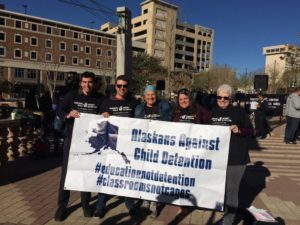
As President Donald Trump declared a national emergency on the border, teachers from across the nation declare an emergency of their own. Five Alaska teachers traveled thousands of miles to advocate for immigrant children’s rights this weekend. They took part in a national teachers’ protest in the border city of El Paso, Texas.
Hundreds of educators and allies gathered in El Paso’s San Jacinto Plaza to protest the detention of immigrant children and families with a “teach-in,” the educator’s version of a “sit-in.” The event was organized by Teachers Against Child Detention and led by 2018 National Teacher of the Year, Mandy Manning. The group says childhood detention results in long-term trauma.
Ben Walker is the 2018 Alaska Teacher of the Year from Anchorage. He says he came to the teach-in not just as a teacher but as a father and an Alaskan.
“When it comes down to it, regardless of how you feel about our border policy the keeping of children in detention centers for no reason is not okay, so I wanted to speak out about that,” he said.
Some teachers see the protest as part of their vocational duty. Teachers are part of a group called “mandatory reporters” which means that under United States law they must report suspected child abuse to authorities. They say the level of trauma children undergo in detention centers fall under the scope of mandatory reporting. In that spirit, these teachers are speaking out and teaching out against detention centers.
They presented short lessons on the history of immigration in the United States, how to talk to students about immigration, and the effects of immigration and detention on children and their families.
Walker is a science teacher, but his lesson in El Paso included some Alaska history as well. He sees a parallel between the state’s history of boarding schools for native children and detention centers at the border.
“You look at almost any category for trauma and abuse, I’ll bet for every single one Alaska is in the top five. The reason I bring this up here today in El Paso, Texas is that we’ve seen this before and we in Alaska know how this goes,” he said.
“We are a clear case study for the impacts of trauma from the separation of children from families and communities. These schools, like the detention centers we were talking about, were not set up or funded or staffed to truly provide for the needs of these children. And some, like detention centers, were rife with neglect and abuse.”
It’s an Alaskan perspective on a national issue. Michael Pena is the Teacher Coordinator for Teachers Against Child Detention. He says it was important to have teachers from all over the United States stand together.
“The border is the site of the crossing, but when we look at our classrooms, we are looking at kids that come from all over the world through different pathways. These are kids that are in our classrooms and we have to be able as educators we have to reach all sorts of kids and all sorts of conditions. One of the consistencies we want to bring to them is education,” he said.
Three thousand miles each way to Texas may seem like a long way, but retired science teacher Patty Brown from Haines says Alaskans are used to the travel. She says it’s her responsibility as an American and a teacher to be there.
“We are part of the United States and we are part of the people who have to speak up and say this isn’t okay,” she said. “Alaska has plenty of immigrants. I have no way of knowing how many are undocumented immigrants. But there are many people in Alaska doing the hard work in fisheries and airport catering and who knows what else that may or may not be documented.”
Alaska teachers Al Licata, Cheryl Childers, and Janice Littlebear were also in attendance. Teachers Against Child Detention says this event is their first but not their last. They plan to continue to advocate for immigrant children and families.




